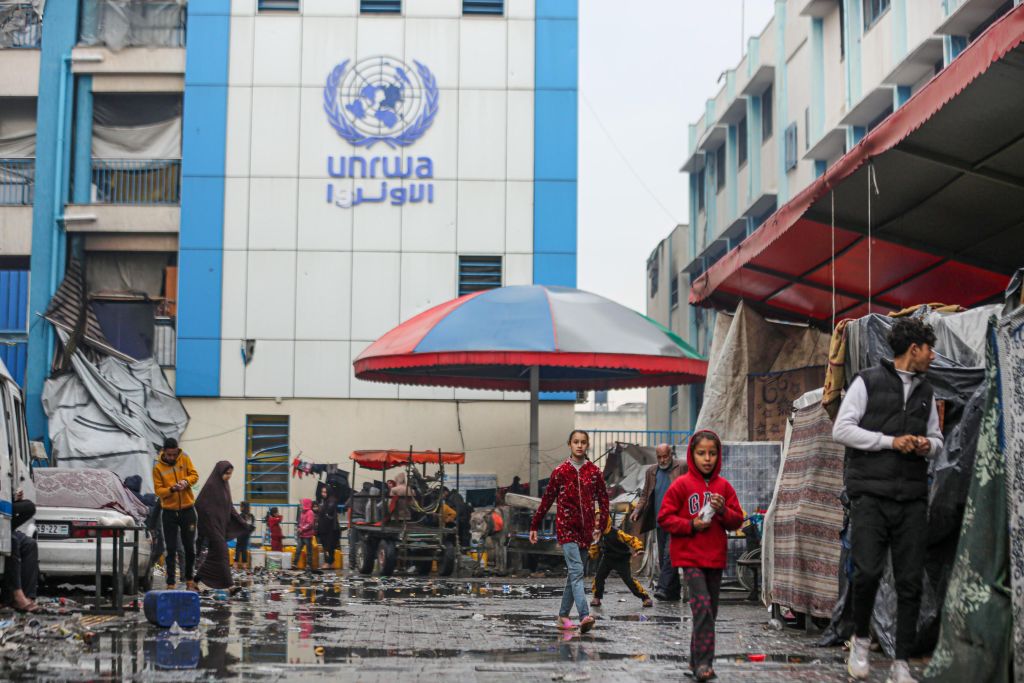
Late last month, the Biden Administration announced that it was suspending funding to the United Nations Relief and Works Agency (UNRWA), the main organization providing humanitarian aid to Palestinian refugees. The decision is catastrophic for the thousands of Palestinians in Gaza trying to survive Israel’s onslaught, including my family, who depend on it.
Some 80% of Palestinians in Gaza are refugees and benefit from the services UNRWA provides. My family is among them. We come from Na’alia originally, in what is now part of the Israeli city of Ashkelon. My grandparents were forced out of our village in 1948 during the creation of the state of Israel, or what we Palestinians call the Nakba, or “catastrophe.” They fled to Gaza and settled with thousands of other expelled Palestinians in what became Jabalia refugee camp in northern Gaza.
UNRWA ensured that my grandparents, then my parents, and later my siblings and I, had the basic necessities that we needed to survive. My parents, now retired, made decent wages teaching in UNRWA schools. The education I received at UNRWA elementary and middle schools was on par, if not superior, to the education my own children receive in California, where we all live. In fact, the foundation that I received from my UNRWA education allowed me to flourish; I received a Fulbright Fellowship from the U.S. Department of State in 2004, and pursued my Master’s degree and Ph.D. in electrical engineering in the U.S. The UNRWA clinics also ensured that our vaccinations were up to date, and that we had regular medical check ups, vitamins, and dental care.
President Joe Biden’s decision to cut funding was made in response to accusations from Israel that 12 out of UNRWA’s 13,000 employees in Gaza took part in the Oct. 7 attacks. UNRWA has fired 9 of the accused (one is dead and two others are missing) and announced an internal investigation. Yet the U.S. and more than a dozen other countries took the unprecedented step of freezing their support for the agency, in what many have called a form of “collective punishment.” As noted by the U.N. Special Rapporteur on the Occupied Palestinian Territories, in doing so the U.S. and other governments may be violating their obligations under the Genocide Convention.
Cuts to UNRWA’s funding threaten to cripple it precisely when Palestinians need it most, as Israel’s devastating military assault on Gaza has killed at least 27,000 people and displaced 1.7 million others. UNRWA’s support is, in many cases, the thin line keeping hundreds of thousands of people away from death by starvation or disease caused by Israel’s refusal to allow more than a trickle of food, water, medicine, and other essential aid to enter Gaza. This is the time to ensure that Palestinians get more humanitarian assistance—not to strangle one of the few and most important organizations providing assistance.
Read More: The Horrors I've Seen Treating Patients at Gaza's Hospitals
UNRWA is now on track to lose $65 million by the end of February, as donor funding cuts kick in. Because the U.N. agency has no significant reserves, it will not be able to pay its 13,000 workers in Gaza from March, a spokeswoman told the New York Times.
Israel has given a confidential document to the Biden Administration but has not publicly released the evidence it purports to have against the UNRWA employees. Britain’s Channel’s 4 News has reviewed the document and says it “provides no evidence to support its explosive new claim” that UNRWA staff were involved in the Oct. 7 attack. (The U.S. Secretary of State Antony Blinken has said that “We haven’t had the ability to investigate [the allegations] ourselves, but they are highly, highly credible.”) Even if the allegations prove true, an entire U.N. agency should not be imperiled based on allegations concerning less than 0.1% of its workforce.
UNRWA must be allowed to continue its critical work, which is carried out by thousands of courageous employees at great risk to themselves. At least 150 UNRWA employees have been killed since Oct. 7. They include my cousin, a principal of an UNRWA school, who died alongside eight members of his family by an Israeli airstrike in the Nuseirat refugee camp.
UNRWA schools where I studied as a boy have become shelters for displaced families. One of them, Jabalia Boys Elementary School, has been struck by Israeli air raids—forcing those who were sheltering there to flee yet again. UNRWA has already been forced to shut down most of its operations in the northern part of Gaza and works only in the south.
Israel’s claims against UNRWA came on the heels of the International Court of Justice’s landmark ruling that it was plausible that Israel is committing genocide in Gaza and ordered it to “take all measures within its power” to prevent acts of genocide. Many have suggested that the timing of Israel’s accusations was to distract from the ICJ ruling. Moreover, it’s not lost on Palestinians that Biden cut funding to UNRWA based on unproven allegations against a small number of employees but has announced no measures against Israel following the ICJ ruling.
Even if a new ceasefire is agreed upon as Blinken takes part in another round of Middle East shuttle diplomacy, UNRWA’s work will remain essential. As me and my family, alongside millions of other Palestinians know all too well, the Biden Administration and other world governments must restore full funding to UNRWA immediately to avoid an even greater humanitarian disaster in Gaza.
More Must-Reads from TIME
- Cybersecurity Experts Are Sounding the Alarm on DOGE
- Meet the 2025 Women of the Year
- The Harsh Truth About Disability Inclusion
- Why Do More Young Adults Have Cancer?
- Colman Domingo Leads With Radical Love
- How to Get Better at Doing Things Alone
- Michelle Zauner Stares Down the Darkness
Contact us at letters@time.com